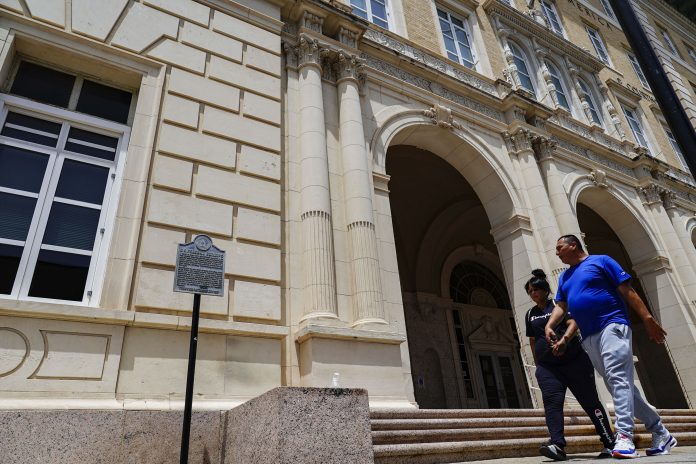
|
Only have a minute? Listen instead
Getting your Trinity Audio player ready...
|
The city of Brownsville appears poised to do away with its two economic development organizations, the Brownsville Community Improvement Corporation and the Greater Brownsville Incentives Corporation, and replace them with something called the Greater Brownsville Municipal Development District.
At their regular meeting on Tuesday, city commissioners unanimously approved the first reading of an ordinance calling for a special election May 4 to terminate BCIC and GBIC and create GBMDD.
During his presentation, City Attorney Will Treviño discusses the advantage of moving to a municipal development district, or MDD, and how they differ from traditional economic development corporations like GBIC and BCIC. He described an MDD as a “special purpose district for generating economic development and growth opportunities, including quality of life projects.”
An MDD is able to take advantage of sales and use tax within the city limits, as well as within the city’s Extra-Territorial Jurisdiction Territory (ETJ), a buffer zone contiguous to the city’s corporate boundaries, while EDC’s can only use sales tax from within city limits proper, Treviño said. GBIC and BCIC each are supported by a quarter-cent sales tax.
Treviño stressed that creating an MDD would not mean a new tax, since the tax revenue for it is already being collected.
While BCIC and GBIC are nonprofits created by the city and subject to rules governing nonprofits, an MDD is a “true political subdivision of the state and the city,” Treviño said. That means the MDD would be subject to the same law the city is regarding things like public information and open meetings, though GBIC and BCIC are also subject to such things by statute.
An MDD would take it a step further, though, since it would enjoy greater — though not total — immunity from lawsuits as governmental bodies do. EDC’s do not enjoy such immunity, Treviño said.
A Brownsville MDD would be governed by a single board of seven members serving staggered two-year terms, and who could be removed at any time with or without cause, he said.
Treviño said the commission would also consider adopting an ordinance creating a restrictive fund, so that at least 50% of sales and use tax revenue flowing into the MDD would be earmarked for quality of life projects — unless overruled by a two-thirds majority of commissions and MDD directors.
Qualify of life projects include “anything related to children’s sports” including facilities, public park facilities and events, trails, open space improvements, museums, exhibition facilities, related transportation facilities and the like, he said.
“(An MDD) can accomplish pretty much everything that GBIC and BCIC can do for the most part, with fewer procedural matters,” Treviño said.
He said that, according to the state comptroller’s office, approximately $400,000 a year from the city’s ETJ is “being left on the table.”
“This is additional revenue that the city believes would help fund projects both within the city and the ETJ,” Treviño said.
“I want to point that this is not a city of Brownsville department,” said City Manager Helen Ramirez during Treviño’s presentation. “It would be its own separate entity, and I think that should be clear.”
Brownsville Mayor John Cowen Jr., speaking to The Brownsville Herald on Wednesday, said that if voters approve terminating BCIC and GBIC and forming the MDD, all staff from the old EDC’s would be transitioned to the new entity.
“I think the commission, we all agree, that we want to make sure that both staffs are 100% intact,” he said. “We’ll merge the two entities basically into one and ensure that the projects and programs that are currently being done by both entities will continue to operate. What this really does is it streamlines the two organizations into one, and we’re able to tap into the sales tax in our ETJ area.”
In light of the substantial growth occurring within the city limits and ETJ boundaries, setting up an MDD is a forward-looking move to make it possible to bring in more funds for more projects, especially quality of life projects, within the city limits and ETJ, Cowen said.
“When I got elected in 2019 I met with the state comptroller’s office,” he said. “They recommended this model as a model most cities are going towards now, specifically because you can access more funds for economic development projects and quality of life projects. A lot of people resist change, but I think this is a good move, and we’ll really be able I think to get a lot more done for our community. I really don’t see a lot of negatives on this move.”




